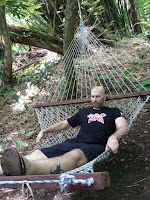During this time it's too late to learn a new technique you can rely on at the competition. All your training should focus on solidifying your existing skills. You may need a refresher on some escapes or takedowns but these should already be in your repertoire. The last two weeks are for refinement, healing any injuries and mentally preparing for combat.
The two weeks prior to the comp should begin with tapering off your training. Up until this point you should have been training often and at high intensity comp pace. These sessions need to ease off to allow time to recuperate and avoid injuries that could sideline us from the competition.
The comp team sessions should change gears and focus more on strategy, flexibility, core strength and tightening up the techniques to be utilised on the day.
The week before
A training camp is like an extended session. You need a warm up, skills sessions and the warm down. One week out you are warming down and shouldn't be training that hard. Come to classes and be as technically sound as possible. What this means is to focus on the mechanics and body positions. If there is free rolling then take it slow, and ask your partners to do the same. This week is about winding down and resting so you need to conserve energy.
Tap early and tap often during this week. Don't fight to escape something that is only half on. Remember you don't want an injury and even a slight muscle strain could cause issues at the comp. A good test is to check three things:
- Are you able to speak without panting?
- Are you standing in a puddle of your own sweat?
- Are you using strength or high intensity, rapid movements to escape?
 If you answer yes to any of these you are going too hard. Don't ask for a "light roll" as that is a rare beast, one that is an endangered species with lower belts. Instead do situational rolling. Start in guard and reset after a sweep or pass. Start in back control and maintain position without going for a submission. Put limitations on yourself and your partner and treat this as live reps with active resistance. This pressure tests your technique without causing harm or fatigue. If you deviate from this simply tap and reset.
If you answer yes to any of these you are going too hard. Don't ask for a "light roll" as that is a rare beast, one that is an endangered species with lower belts. Instead do situational rolling. Start in guard and reset after a sweep or pass. Start in back control and maintain position without going for a submission. Put limitations on yourself and your partner and treat this as live reps with active resistance. This pressure tests your technique without causing harm or fatigue. If you deviate from this simply tap and reset.I highly recommend you visit with a sports physiologist or remedial masseuse at least once this week. This will smooth out any niggling issues for optimal performance.
The night before
You should not be training the day prior to your comp. Resting and conserving energy is a primary reason, however you also need to clear your mind. At this point you have been training hard for three months. Having some mental time away and focusing on anything else for a day or two will help reset your mind. Its like having a rest day with weights. Your body and mind need time to absorb everything.
Relax in whatever manner is appropriate to you. I'm partial to playing video games or pool, or simply watching TV with my wife. The point is to forgot about training for a day.
 |
| The Sleeping Giant, Fiji |
Don't drink alcohol. I'd suggest only water but if you must have something else then coconut water or 100% orange juice are good choices.
For your meals you can generally just stick with your normal plan. As you haven't been training for a day or two, and a week of light training before that, you will already be "carbo-loaded" from the unused energy.
Don't stay up late, and ensure you get your normal amount of sleep. Nerves may hinder actual sleep but if you go to bed at midnight normally, then continue to do that. Keeping to your routine means you don't have to think too much and can lessen stress.
The morning of
Most competitions will post a start time for the first matches, as well as a schedule for when you are expected to compete. Ensure you eat breakfast at least two hours prior to weigh in. This will give time to remove the contents from your stomach and turn it into fuel. You'll need carbs but don't overdo it. I generally just eat my normal breakfast (a bowl of weetbix) and add in a couple bananas.
If you don't compete until the afternoon you will have to grab some lunch as well. Again time it two to three hours before competing. Also bring some snacks and water. I carry at least four bananas and a box of muesli bars. Even if I don't eat them all, my team mates can have them. As my divisions are normally in the mid to late afternoon I bring a couple of sandwiches for lunch. I might eat one at 11am and the second and 1pm for a 3:30pm start.
Every competition for me is a minimum of a 80 minute drive. If you can swing it do this travel the day before especially if you are travelling interstate. Don't try to fly in on the day, race to the venue to compete and then fly out that evening. You won't perform at your best.
For me, if I need to fly I will go down the day before and stay two nights. This way I get a good sleep the night before, and I don't need to rush to take my flight home if the comp runs overtime. If its in Melbourne (90 minute drive give or take) I will drive down with a few other team mates. We get there early enough so the first competitor is present at least 45 minutes prior to start time. Try to get someone not competing to drive so you can rest as needed. Travelling in the same car as your coach will allow discussions of final prep and anything else you may need.
Wear comfortable casual clothes for the trip and bring a bag with the following:
- two pairs of shorts, or two pairs of tights for females
- two rash guards
- your mouth guard
- a change of undergarments i.e. jocks and socks
- a towel
- two bottles of water
- snacks i.e. bananas and muesli bars
- lunch i.e sandwiches
- nail clippers
- a device to record video on
 |
| You heard the stoner. |
The video recording device (mobile phone) is so you can review your performance later. This leads me into the next article (click here) where I focus on the actual competition and what to do afterwards. Hit the comments with any questions or if you want to share your competition stories.
I like the Fiji photo :)
ReplyDeleteWow i can say that this is another great article as expected of this blog.Bookmarked this site.. Günstige Flüge
ReplyDelete